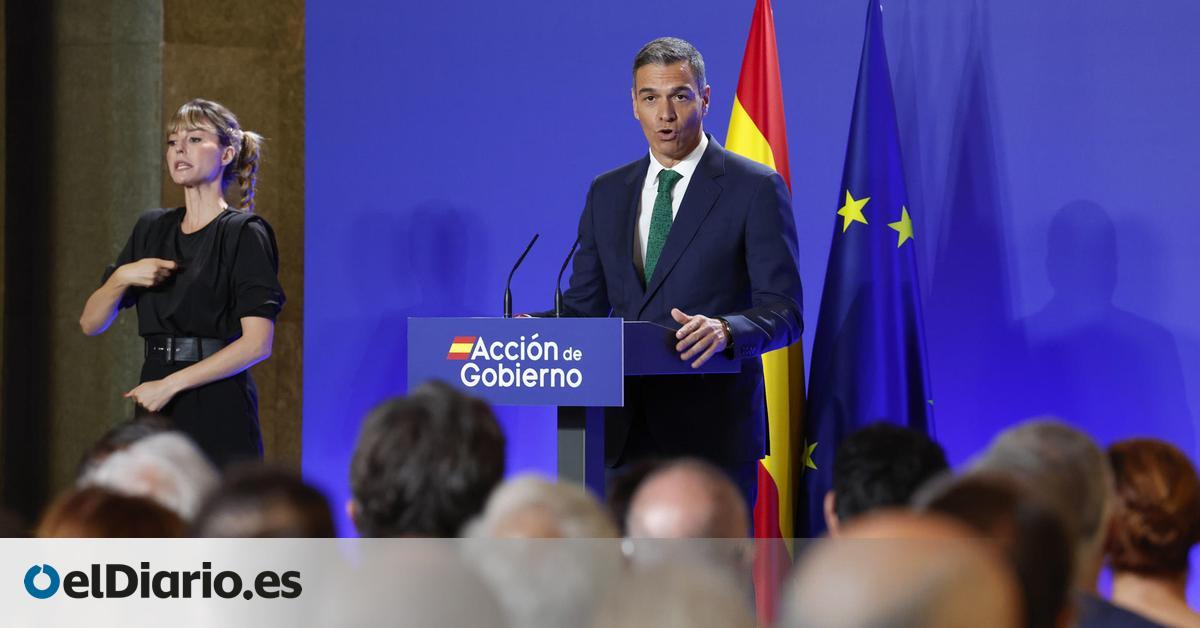
Changes in the Council of Ministers, in his closest team in Moncloa and in the leadership of the PSOE. And the commitment that the Government does not set itself any other horizon than to complete its mandate with an agenda of progressive reforms that deepen the path taken during the last six years. With this message Pedro Sánchez tried this Wednesday to practice a kind of electroshock therapy to a legislature on ‘stand by’ due to the lack of a clear majority in Congress that provides stable parliamentary support to the Executive. A difficulty that the president showed himself determined to face during his speech at the opening ceremony of the political year.
“The government is here for a long time. If this Executive has learned anything, it is to sail against the wind. And we will make the most of the time as we have always done,” he said, given the uncertain outlook for essential partners such as Junts and ERC, whose internal situation complicates even the possibility of negotiating the General State Budget.
And in the face of the legislative paralysis that his precarious majority has brought about, Sánchez dusted off some key flags in left-wing policies, such as taxation or housing. He promised more taxes on the rich, measures against speculators and a system of regional financing based on squaring the circle: that all the Autonomous Communities come out winning. He did not advance what the formula will be.
“In these seven years, the Spanish Government will have transferred a total of 935 billion euros to the Autonomous Communities; that is, 300 billion euros more (32%) than what the Rajoy Government transferred in the same period. We are fulfilling our promise. The problem is that the autonomous communities governed by the right have not dedicated these resources to the citizens. They have dedicated them to increasing the contracts of a few companies and to financing their tax gifts to the richest”, he pointed out as a starting point for his approach to the reform of financing.
The President of the Government even went so far as to expressly point out some PP regional governments, such as the case of the Community of Madrid. “Between 2018 and 2023, the Madrid community received almost 100 billion euros from the Government of Spain. 21% more than what the Rajoy Government transferred to it. But, at the same time, its tax cuts, always aimed at benefiting the highest incomes, reduced Madrid’s income by 31 billion euros. In other words: of every ten euros that the Government of Spain has given to the Community of Madrid to improve the lives of Madrid residents, the regional government has used three to make tax gifts to the rich,” he criticised.
Against this backdrop, Pedro Sánchez pledged to ensure that the reform he will undertake, which is based on the agreement between the PSC and ERC on Catalan taxation, will end up benefiting all the territories. “Decentralisation is perfectly compatible with guaranteeing solidarity and equity between territories, and with guaranteeing sufficient resources, provided that the autonomous governments assume greater fiscal co-responsibility. In fact, I assure you, I promise that with the reform we will propose, all the Autonomous Communities of the country will receive more resources than they received while the PP was in power,” he said.
Regarding the future of the legislature, he promised that the Executive would present a draft of the General State Budget to Congress, even if it does not have the support guaranteed to push it through. He also promised that next week the Council of Ministers would approve a new spending limit to be submitted to Parliament.
In addition, Sánchez promised during his speech to deepen his government’s fiscal policy so that the rich pay more taxes. “We will continue to move towards a more progressive tax system, with taxes that tax those who have more and guide the productive model. We will launch new actions aimed at limiting the disproportionate privileges of certain elites and taxing those who already have enough money in the bank to live a hundred lives. We will do this, I insist, not to harm millionaires, but to protect the middle and working classes from an unfair system.” For the moment, this announcement has not yet materialized in measures that will be promoted in the short term.
The president also focused on the difficulties in accessing housing and announced that this will be the main point of the Conference of Presidents to be held in Cantabria on a date to be determined in the autumn. “We want our young people to become independent at an earlier age. That is why, in the coming months we are going to do more. We will promote new measures aimed at expanding the public housing stock, pursuing speculation, establishing a better balance between tourism activity and the well-being of residents, and ensuring that housing is a right for all and not the business of a few,” he argued.
Sánchez, who announced a round of bilateral meetings at the Moncloa with all the regional presidents, also confirmed on Wednesday the changes in his Executive and in his closest team: Minister José Luis Escrivá is now officially the new governor of the Bank of Spain and his position will be occupied by the current chief of staff of the president, Óscar López. In replacement of López, Sánchez’s shadow for the last three years, the leader of the Executive places Diego Rubio, who has been director of the National Office of Foresight and Strategy and general secretary of Public Policies, European Affairs and Strategic Foresight.
These will not be the only changes, because in December the third vice-president, Teresa Ribera, will leave and take up one of the new vice-presidencies of the European Commission in Brussels. Pedro Sánchez also plans to move the Ferraz pieces. This Saturday, the party leadership will officially convene the PSOE Congress, which will take place on November 30 in Seville and in which changes in the party leadership will be addressed. This congress will also give way to the regional congresses, for which there is also the expectation of the renewal of a good number of territorial leaderships for the next political cycle, which, barring surprises, should start in June 2026 in Andalusia.
Source: www.eldiario.es

